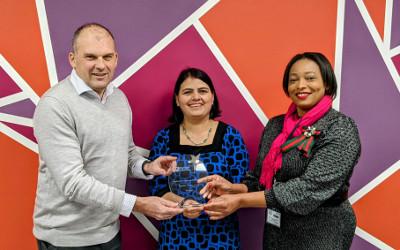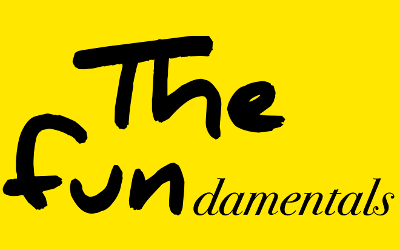People's Choice-winning sex-trafficking survivor research recognised

Professor Kevin Shakesheff, Pro-Vice-Chancellor for Research and Innovation at The Open University (OU), presented Dr Margaret Ebubedike and Dr Saraswati Dawadi with The People's Choice award for their research helping sex-trafficking survivors rebuild their lives at a ceremony at the University's Milton Keynes Campus earlier this month.
To tackle today’s biggest societal challenges, the OU has committed to focusing all of its research around three core pillars: sustainability, inequality and living well.
Drs Ebubedike and Dawadi’s work received the most votes among four current cutting-edge research projects the OU put to a public vote to launch the new focus areas.
A docuseries led by British model and environmentalist Lily Cole explored the projects further, asking crucial questions impacting our society. The other three projects asked:
- How can we “age well”, and what does that really mean? (Dr Jitka Vseteckova)
- How can we improve the education system in India? (Dr Simon Cross, Professor Freda Wolfenden and Dr Lina Adinolfi)
- How does researching water on the Moon improve the sustainability of resources and health on Earth? (Professor Mahesh Anand, Dr Simeon Barber, and Dr Simon Sheridan)
Watch the docuseries now:
As a society we are facing unprecedented challenges that threaten our future. The Open University is refocussing their research efforts to find solution around sustainability, living well and equality.
Lily Cole: I’m here at the campus in Milton Keynes to learn more about the ground-breaking research that happens here.
How can we extract water from the moon?
Professor Mahesh Anand and his team are conduction pioneering research into extracting water from lunar rock. Technology that could have huge implications for dealing with droughts on Earth.
Professor Mahesh Anand: So something that’s quite fascinating about space exploration, that it actually forces you to challenge your comfort zone. So you have to go out of your comfort zone to actually come up with new and innovative solutions. So in this case, we are trying to develop the technology that could one day be extracting water from the actual lunar samples.
Some of that technology that actually we are currently working on for lunar application, the hope is that one day we will find a direct application here on Earth to improve the quality of life for fellow human beings.
Lily Cole: Professor Mahesh‘s work is cosmic and inspiring. His team are working with NASA and some of the top scientists around the word. What really excites me about their research is the way in which it might help solve some of the greatest sustainability challenges we have here on Earth.
How can we age well, and what does that mean?
Lily Cole: With advances in modern medicine, our life expectancy is increasing. Dr Jitka Vseteckova’s research into the ageing process, has led her to develop five pillars of good health and longevity. She shares her research through talks in the community to encourage and empower people to take responsibility for their own ageing process.
Dr. Jitka Vseteckova: I research ageing and I lead ‘Ageing Well’ public talks here at The Open University. The talks are structured around the five pillars for ageing well: nutrition, hydration, physical activity, social and cognitive stimulation. So it’s not one thing that will make us age well, it will be a combination of things that are the right things for us.
How can we empower victims of human trafficking?
Lily Cole: Dr Saraswati Dawadi is conducting vital research into improving the lives of human trafficking survivors.
Dr. Saraswati Dawadi: We are trying to empower the girl victims of human trafficking. Because in Nepal it is estimated that 54 girls are trafficked to India every single day.
We are trying our best to listen to the voices of the girl victims of human trafficking. And then we are trying to provide the right kind of training to them. In the way, we are preparing them for future so that they can contribute to supporting other girls who have become the victim of human trafficking.
Lily Cole: Dr Sarasvati’s research is part of The Open University’s Social Justice mission. It’s having a real impact on these women’s life today and also creating a sustainable change for the future.
How can we improve teacher training in India?
Lily Cole: Simon Cross and a team of academics working with Tata Institute of Social Science in Mumbai are researching how teacher training can be improved at scale.
Dr Simon Cross: In particular, we’ve been interested in using digital badges and seen them as a potential tool to help support teachers. And our research has focused on the ways in which digital badges could be used in that kind of practice setting.
Lily Cole: And what is a digital badge?
Dr Simon Cross: The digital badge is essentially a graphic or a symbol which is hyperlinked to information, which explains what the person did to earn that badge. Not only can we deploy them at scale, but it also means teachers can collect and shared them digitally as well.
Lily Cole: This ground-breaking research is just the tip of the iceberg of what’s going on here at The Open University. All four of these project have been nominated for the People’s Choice Award.
Winning Project: How can we empower victims of human trafficking?
Lily Cole: If you would like to find out more about research projects or courses at The Open University, go to www.open.ac.uk.
Dr Margaret Ebubedike said:
"Having our research recognised by the public is a fantastic experience. We both worked hard on this project, and it's an area of high importance which is significantly under-researched.
"Most importantly, we feel that finally the voices of these girls have been heard, action will happen, and the girls will no longer be at risk of being re-trafficked."
Dr Saraswati Dawadi added:
"I feel encouraged by the response from the public to try and reach out to more girls who have been the victims of sex trafficking and contribute more to these societies through our research."
Professor Kevin Shakesheff, Pro-Vice-Chancellor, Research and Innovation, said:
"It was wonderful to present Margaret and Saraswati with this People's Choice Award, recognising their inspirational research.
"The positive impact this research will have on sex trafficking survivors reminds us why our social mission to improve lives remains at the front and centre of all that we do."
You may also be interested in:
Contact our news team
For all out of hours enquiries, please telephone +44 (0)7901 515891
Contact detailsNews & articles

The FUNdamentals: Why fun matters more than we think
In a world that feels increasingly serious and pressured, fun can seem like a guilty pleasure — something optional, even frivolous. But what if fun isn’t an add on at all? What if it’s essential?